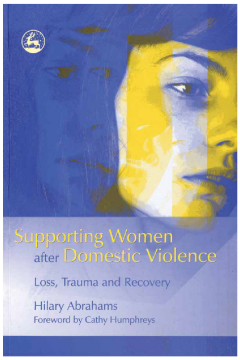
Additional Information
Book Details
Abstract
This is really interesting and compelling book. Abrahams' writing style is readable and engaging and is interspersed with reference to research and powerfully, the words of women who have experienced domestic violence. Right from the beginning of this book, there are passages that challenge stereotypes and tackle stereotypical thinking regarding women who experience domestic violence... Very engaging, Really useful. Powerful and authoritative, I'd recommend this book to anyone working with women, whether in the community or the workplace. I have worked with a variety of groups (children, families, people with mental health problems, older people) and domestic violence has been a factor in working in all these areas of work. This text will certainly be useful to me and no doubt to many others addressing issues of domestic violence.'
- Well-Being
'Abrahams gives us a sense of how lives are shattered and rebuilt in this compelling book that is the culmination of a research project exploring the experiences of women and children in three refuges in the UK... It is a key resource for those working within women's refuges, as well as for professionals whose work brings them into contact with victims of domestic violence. Those tasked with developing and implementing public policy would also find it enlightening.'
- Therapy Today
'Compelling reading for anyone working with women and children living with and leaving domestic violence.'
- From the Foreword by Cathy Humphreys
Women who leave an abusive relationship often experience feelings of fear, bewilderment, anger and confusion. The trauma caused by domestic violence leaves a legacy that stays with the survivor, and it is not uncommon for women to experience feelings of loss and grief similar to those following bereavement, but made more complex by the effect that abuse has had on their emotional health and well-being.
Supporting Women after Domestic Violence offers accessible advice on how to enable women who have experienced domestic violence to embark on a journey of recovery. The book draws on theory, original research and the personal experiences of women who have encountered domestic violence to explore the complex practical and emotional support they need when engaging in the process of recovery. It highlights the difficulties a victim of domestic violence may encounter following an abusive relationship, offers action points to improve service provision, and covers important issues in recovery, such as the value of mutual support and how women can regain a sense of normality and self-esteem.
This book will be a key resource for those working within women's refuges, as well as social workers, counsellors, mental health professionals and many others whose work may bring them into situations where domestic violence is an issue.
Hilary Abrahams is an Honorary Research Fellow in the Violence Against Women Research Group at the University of Bristol. She has worked extensively on the support needs and service provision for families where domestic violence is an issue, including a major research project evaluating the housing and support schemes funded by the Safer Communities Supported Housing Fund.
With quotes from women woven throughout the book, insights are offered into the fear, loss, conflict, and hope experienced by women living in refuges, as well as the roles that refuges and refuge support workers play in women's journey through and beyond domestic violence. This is a useful book for anyone wishing to better understand the impact of domestic violence.
Australian Social Work
Abrahams' book is an important and highly engaging contribution to the domestic violence literature both in the UK and internationally. It should be commended both for its close attention to the details of women's everyday lives and its salient warnings about the structural barriers to the important recovery work in which refuges play a pivotal role.
Sociology
This book provides a start reminder of the courage and strength of women who survive in abusive relationships and those who leave. This book combines theoretical perspectives with actual feedback from women and workers in a way that is accessible, informative and constructive. Essential reading for anyone involved in this field, whether it be direct service provision, referrals, service commissioning and funding or any other variation.
The Domestic Abuse Quarterly
Table of Contents
| Section Title | Page | Action | Price |
|---|---|---|---|
| 1 Introduction to wellbeing ranking: developments in applied community-level poverty research | |||
| 2 How wealth ranking was developed | |||
| 3 The history of wellbeing ranking techniques | |||
| 4 Some practical examples and what users say about wellbeing ranking | |||
| 5 Methodological issues in wellbeing ranking | |||
| 6 Using participatory wealth ranking in a South African microfinance organization: the value of scale | |||
| 7 Wellbeing ranking, semi-structured interviews and practitioner bias: personality traits and participatory narratives | |||
| 8 Wellbeing assessment in practice: lessons from wellbeing and poverty pathways | |||
| 9 Wealth ranking to wellbeing: Where next for development? | |||
| 10 Conclusions about wellbeing assessments and ideas for the future | |||
| Annexes | |||
| 1. How to do wellbeing ranking | |||
| 2. How to do wellbeing groups | |||
| Index |
